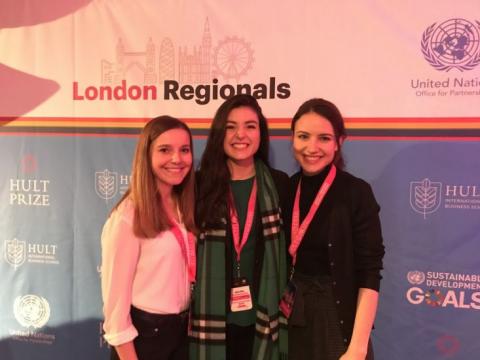We met during our master’s degree programme in sustainability and social innovation at HEC Paris, one of Europe’s leading business schools. We connected over our common desire to create employment opportunities for young people in Africa and to find solutions for sustainable food production and waste management.
During her gap year, Ludivine had worked in Uganda, where, together with colleagues Tommie Hooft and Boby Ogwang, she developed a circular agriculture project using black soldier flies to transform city waste into a sustainable protein source that farmers could feed their poultry. Alessandra and I were moved to collaborate on the project.
When we heard that a Hult Prize programme was taking place on the HEC campus, we were inspired to adapt the business model to respond to this year’s proposed challenge in the social entrepreneurship competition: provide meaningful jobs for 10,000 youth.
Every year, the Hult Prize foundation releases a new challenge dedicated to solving the world’s most pressing social problems. In partnership with the United Nations, the Hult Prize is the largest student competition and crowdsourcing platform, with more than 2,000 colleges and universities from over 100 countries participating annually.
The winning campus teams go on to the regional finals, ultimately competing for one of 40 spots in an incubator. The six best teams are then selected to take part in the global final held at the UN headquarters in New York, with a chance of winning $1 million (about £798,000) of seed capital for their start-up.
How to use your master’s for social good
Our team – Alessandra, Ludivine, Louisa and Tommie – were confident that an adaptation of the waste-to-protein business model had the potential to generate a positive social and environmental impact. We discovered that the market demand for sustainable protein feed for livestock was large enough to scale across Africa and a great opportunity to provide meaningful jobs for 10,000 young people.
This is where the business model for ProTeen was born: an insect farm franchise operated by young Africans – part of a wider project tackling waste generation, food insecurity, climate change and unemployment.
Through our courses, we were exposed to a wide range of concepts in business, sustainability and development, which helped us to design an impact-driven business model that won over the jury at HEC Paris.
Between the campus competition in November 2018 and the London regional finals in March 2019, we refined our prototype with the help of our HEC professors and peers. Alessandra, Ludivine and Tommie enrolled in the Start-up Launchpad, a programme at HEC Paris that aims to coach young entrepreneurs in setting up successful start-ups by providing classes, space and mentorship.
We entered the London regional competition equipped with a solid team and a strong concept. We had six minutes to convince the jury of ProTeen’s potential. After pitching a second time during the final in the evening of the competition day, we were thrilled to be announced as the winning team, along with one from the University of Oxford.
We would not have made it this far in the competition without the guidance, support and sheer brilliance of our teammates, the alumni and mentors who have inspired us since joining the master’s, and the HEC Paris professors who provided valuable feedback on our pitch.
Also invaluable were the generous HEC student associations and the alumni network, which helped to fund our travel, making it possible for us to compete in London. Our classmates also coached us in public speaking, asked crucial questions and, most importantly, supported our vision.
We are grateful for the support from the HEC community that equipped us for the six-week incubator at the Hult Prize castle, whereby we will develop ProTeen through coaching, mentorship and prototype testing.
By the end of the programme, six teams will be selected for the final at the United Nations in New York this September. Together with the support of our HEC network, a hard-working team and an impact-driven proposal, we are determined to be one of this year’s top teams.
Read more: Why universities should encourage student entrepreneurship

Comments